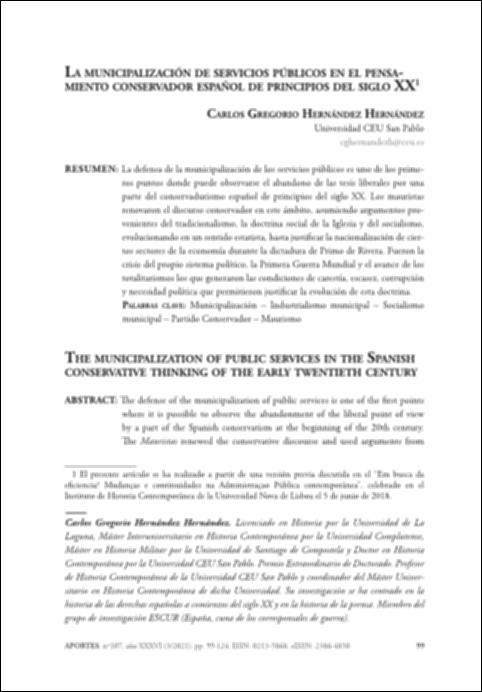Please use this identifier to cite or link to this item:
http://hdl.handle.net/10637/14934La municipalización de servicios públicos en el pensamiento conservador español de principios del siglo XX
| Title: | La municipalización de servicios públicos en el pensamiento conservador español de principios del siglo XX |
| Authors : | Hernández Hernández, Carlos Gregorio |
| Keywords: | Municipalización; Industrialismo municipal; Socialismo municipal; Partido Conservador; Maurismo; Municipalization; Municipal Industrialization; Municipal Socialism; Conservative Party; Maurism |
| Publisher: | Schedas |
| Citation: | Hernández Hernández, C. G. (2021). La municipalización de servicios públicos en el pensamiento conservador español de principios del siglo XX. Aportes. Revista De Historia Contemporánea, 36(107). Recuperado a partir de https://www.revistaaportes.com/index.php/aportes/article/view/660 |
| Abstract: | La defensa de la municipalización de los servicios públicos es uno de los primeros puntos donde puede observarse el abandono de las tesis liberales por una parte del conservadurismo español de principios del siglo XX. Los mauristas renovaron el discurso conservador en este ámbito, asumiendo argumentos provenientes del tradicionalismo, la doctrina social de la Iglesia y del socialismo, evolucionando en un sentido estatista, hasta justificar la nacionalización de ciertos sectores de la economía durante la dictadura de Primo de Rivera. Fueron la crisis del propio sistema político, la Primera Guerra Mundial y el avance de los totalitarismos los que generaron las condiciones de carestía, escasez, corrupción y necesidad política que permitieron justificar la evolución de esta doctrina. The defense of the municipalization of public services is one of the first points where it is possible to observe the abandonment of the liberal point of view by a part of the Spanish conservatism at the beginning of the 20th century. The Mauristas renewed the conservative discourse and used arguments from traditionalism, the social doctrine of the Church and socialism, evolved in a statist sense, even to justify the nationalization of some sectors of the economy during the Dictatorship of Primo de Rivera. It was the crisis of the political sys-tem, the First World War and the advance of totalitarianism that generated the conditions of famine, scarcity, corruption and political necessity that allowed to justify the evolution of this doctrine. |
| URI: | http://hdl.handle.net/10637/14934 |
| Rights : | http://creativecommons.org/licenses/by-nc-nd/4.0/deed.es |
| ISSN: | 0213-5868 |
| Issue Date: | 2021 |
| Center : | Universidad San Pablo-CEU |
| Appears in Collections: | Facultad de Humanidades y CC de la Comunicación |
Items in DSpace are protected by copyright, with all rights reserved, unless otherwise indicated.


